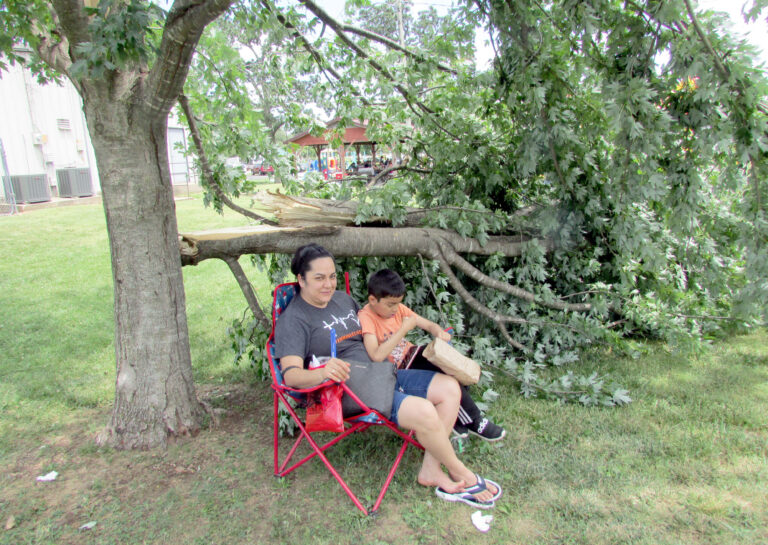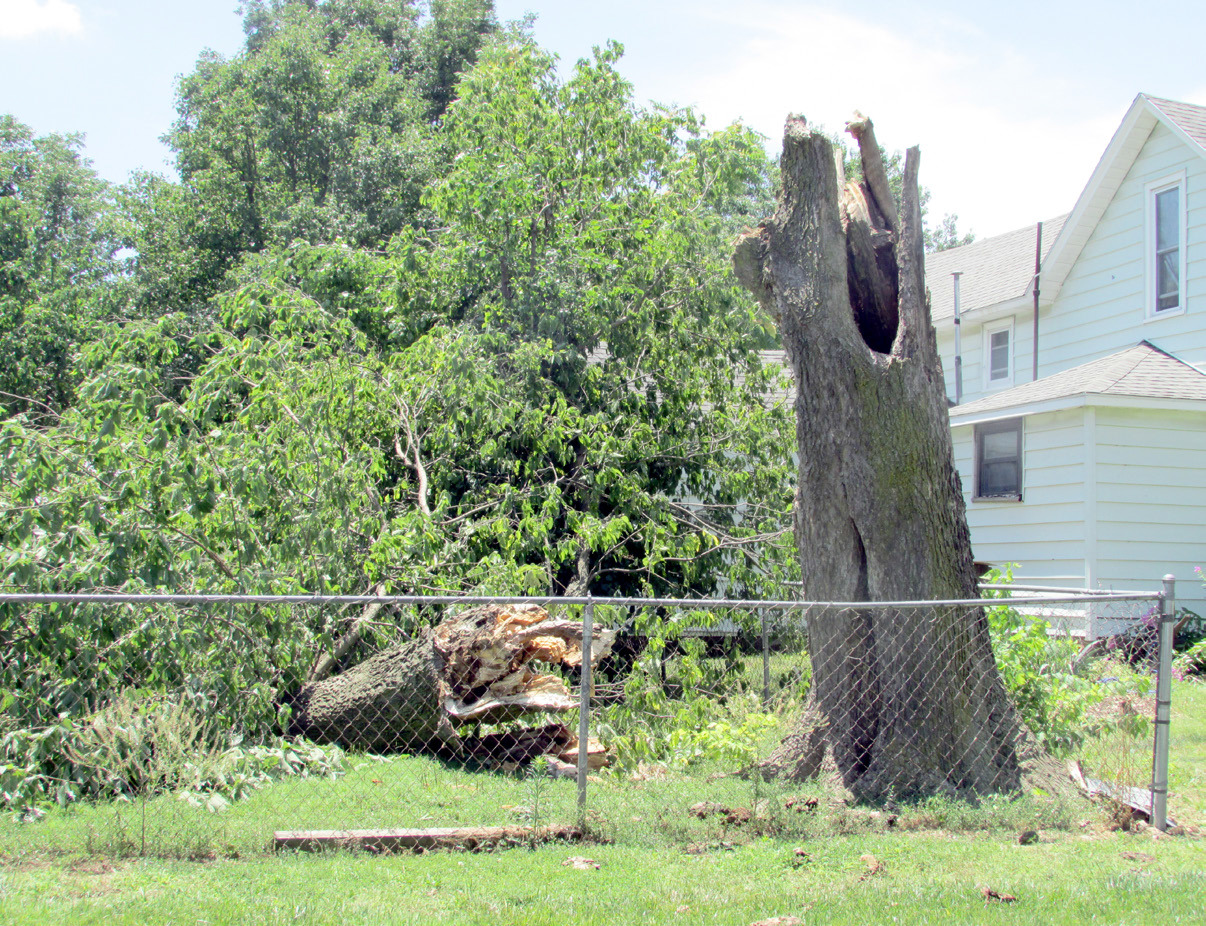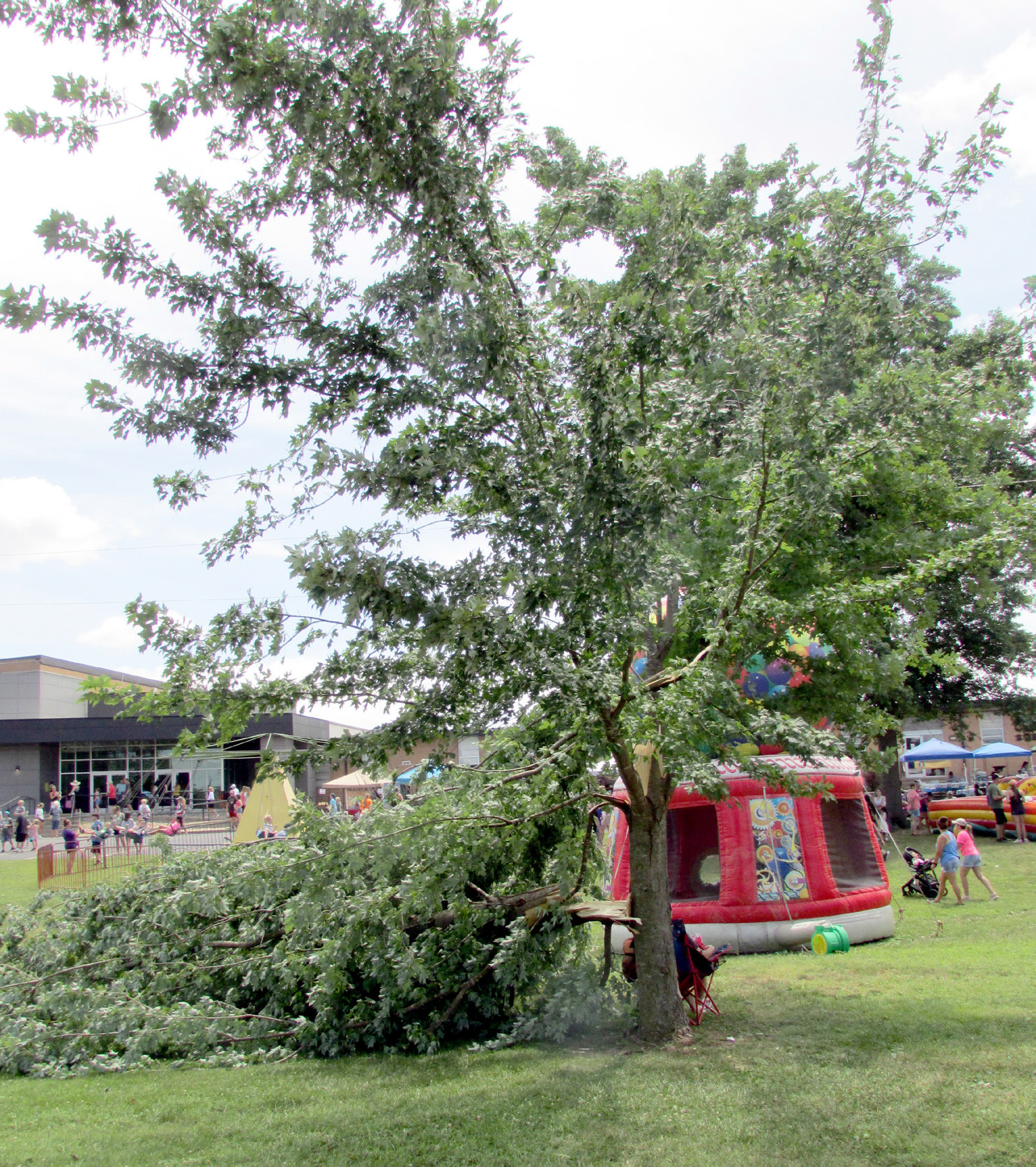Trees, limbs litter highways after 70-mph gusts



By Kyle Troutman ktroutman@cassville-democrat.com
A bow echo storm created damaging wind gusts in Barry County on Friday, uprooting trees and causing road blockages and home damage, especially in the Purdy and Butterfield areas.
David Compton, Barry County Emergency Management director, said most of the damage was to large, mature trees, pushed over from the root ball and covering areas of Highways 97, 148, 76 and 39.
“We saw gusts of 70-75 miles per hour at the bow echo,” Compton said. “Sustained winds were 30-40 miles per hour, but those gusts can cause damage. However, the Weather Service will not be doing a survey since we had no tornadic activity. Some areas showed signs of damage, possibly caused by a downburst or really strong gusts. Damage was pretty consistent with a little bit in Monett with limbs and some trees down, then picking up southeast toward Purdy.”
The National Weather Service reported 1-inch tree limbs broken, shingles blown off and a tree knocking down power lines in Monett; a 60-mile per hour wind gust at the Monett Airport; and 8-inch limbs down, some power poles moved about 10 degrees, roofing blown off chicken houses, power lines down and large hay bales in the roadway in Purdy.
Compton said Purdy and Butterfield sustained the most significant damage, with power out for 12 hours for at most meters, some even longer.
“Purdy and Butterfield are serviced by a Liberty utility line coming from Pierce City, so they are at the end of that repair,” Compton said. “Other than Liberty customers, residents on the east end of the county with Ozark Electric had some outages, and Barry County Cooperative had some outages in the southern part of the county. Carroll Electric’s power was out for a while as well.”
Compton said about 1,900 meters in the county were out, with the majority being Liberty Utilities customers.
“By Saturday morning, we had that down to 1,000, and by noon Saturday, 95 percent had power restored,” he said. “Some individuals still did not have power, but it was spotty and many had to do with drop lines or damage to the home.”
Compton said fire departments were charged with clearing the highway blockages.
“That boils down to going out, cutting the trees and moving them to the side of the road,” he said. “The focus immediately was to get all the major routes back opened. [For weekend storms], people need to be careful, especially at night and on farm roads, because some road districts may not be able to get out to clear until Monday. On those back roads at night, you could come up on a washout or downed tree really fast and not know.”
In the city of Cassville, a tree fell on a home on Schell Street, but initial reports of individuals being trapped were unfounded.
“The resident was not trapped but was having trouble opening the front door,” Compton said. “When [first responders] arrived, they helped him open it.”
The National Weather Service reported the limb fell on the front door, keeping the resident from exiting.
A downed tree a block south of Highway 248 on Farm Road 2175, or East 13th Street, was down for multiple days, as the root ball became tangled in goBEC fiberoptic line and needed multiple agencies to remove.
Compton said there were several reports of damage to roofing and some trees down on or near homes.
“There were some impressive limbs and trees blown over, but thankfully, we had no reports of injuries, and all the weather reports were wind reports,” he said.
Compton said Emergency Management spotters were stationed throughout the county, reporting the roll cloud commonly associated with high wind storms and a bow echo, created by heavy winds behind the front line that bend the front into a bow shape.
“The bow almost became an arrow because it was pushed out so far,” Compton said. “The wind started in Monett, but halfway between Monett and Purdy and through to Butterfield saw the most damage.”
Damage in Purdy included at the city park, where the Purdy Festival was held the next day.
Yanet Perez and her son, Jean Carlo Perez set up their chairs under a tree that had split due to the storm.
Yanet’s husband, Jose Perez, said his family was at home when the storm blew through.
“I was outside working and knew something was about to happen,” he said. “So, I hurried and got our chickens put up, right before debris started flying and trees started falling down.
“We don’t care what happens — rain or storms — the show [and life] must go on.”
Festival Purdy Festival Organizer Renae Neill said the FFA’s livestock tent was destroyed during the storm, an incident which didn’t deter participants.
FFA members were on scene Saturday before dawn, working to remove the shredded tent before Saturday’s show, Neill said.
In spite of the storms, Neill said several people told her they felt like it was the largest attendance they’ve had at a festival up to date.
“I’m amazed,” she said. “Things were pretty questionable when I woke up at 4:50 a.m. to the sound of chainsaws and with no electricity, but we decided we were just going to do what we could.”
Compton said for those dealing with storm damage, especially downed trees and limbs on their property, reporting to the insurance company is the first step, and help with cleanup is typically community driven.
“We see a lot of church groups mobilizing for debris removal,” he said. “My office can help connect those in need. We may have school groups volunteer of AmeriCorps come in, but they usually come for larger storms. Our church groups are reliable and the work tends to get done faster and easier.”
Compton said this storm was likely not damaging enough to qualify the county for public assistance. The threshold to be considered is a declaration of $134,000 in damage.
However, Compton said earlier this year he submitted a declaration of more than $500,000, mostly consisting of rural road damage, to the state that officials chose not to assess.
“There were other cities and counties with wind damage, but they have elected not to make a declaration because the state shows no interest in assessing and they’ve had poor experiences,” Compton said. “That’s really sad, because it hurts those who do declare and us all collectively reaching the $10 million threshold for federal funding. That taxpayer money is there to help free us from disasters and return us to what things were before a storm.”
Compton said road districts especially struggle, sometimes forced to use all their annual funding for damage repairs rather than maintenance or improvements.


